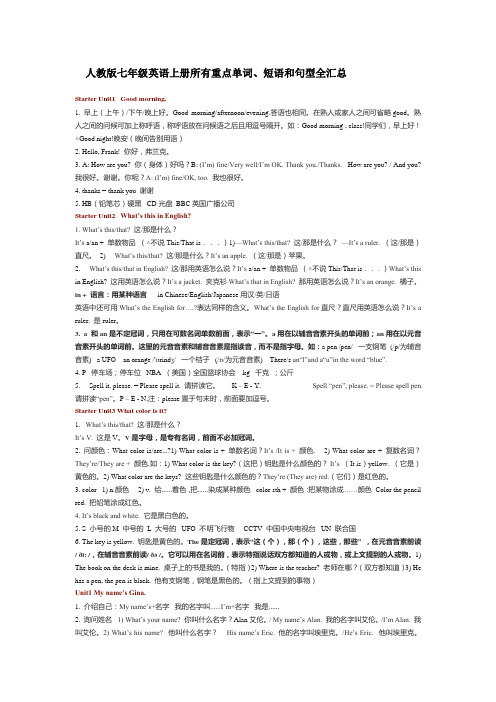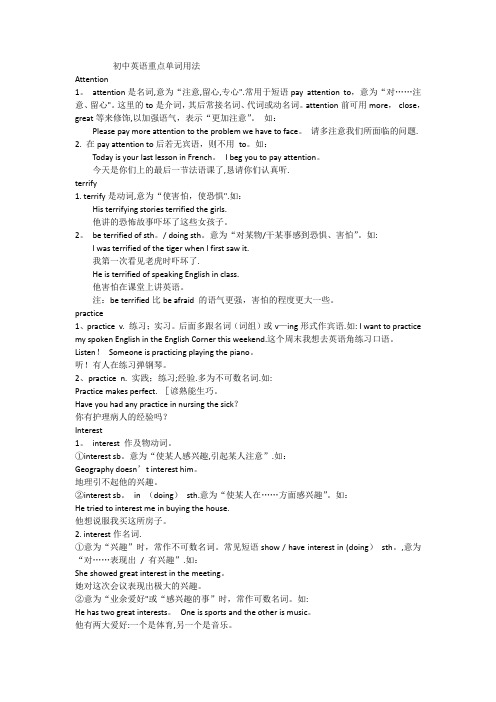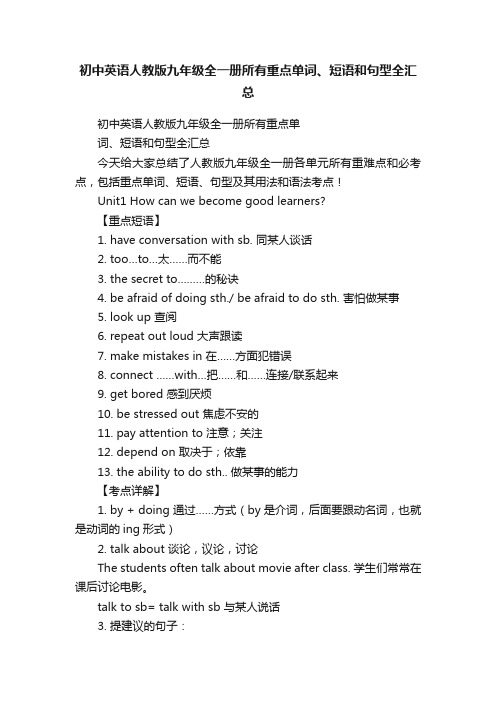英语重点单词和短语用法总结
高中英语必修2第5单元重点单词及短语讲解

必修2第5单元重点单词及短语讲解1.classical/classic1).classical adj.古典的,古典文学的2).classic adj. 经典的,classic music 是“经典的音乐”。
classical music 是“古典音乐”。
I don't like classical music very much.“经典的音乐”的所谓经典,意思是最好的,绝妙的,甚至流芳百世的。
Classic“经典的”不仅可形容音乐,也可以形容其他东西。
我们有时候说,“这句名言真经典!”就是这意思。
2.rollv. 滚动;摇摆;摇晃; n.. 面包圈卷型物roll out 碾平;铺开;动身;离开roll up本义:集结,袅袅上升, 卷起, 到达, 出现, 积累成Roll up! Roll up! Second performance now beginning!快来呀!快来呀!第二场演出又开始了。
Roll up, roll up, to see the lions.进来,进来,看看大狮子。
rock-and-roll= rock music=rock ‘n’roll摇滚乐, 摇滚舞3.folkn. folk作名词有:“父老乡亲,父母”的意思,还有“人们”的意思在英国英语语法里,folk以单数形式做集合名词用;在美国英语中常用folks,也没有错误。
But he wanted to see the old folk again and to visit my mother's grave.(《新概念英语第三册》57课第11行)Adj. 民间的Folk custom民俗 folk dance民间舞蹈 folk hero民族英雄 folk music民间音乐 folk singer民间歌手*** a knife and a fork和 a knife and fork 的区别?用法?一个说的是一副刀叉(a knife and fork ),另一个说的是一把刀和一把叉(a knife and a fork).如果是a knife and fork作主语,谓语动词用单数.(因为一副刀叉表示的是一个整体.)如果是a knife and a fork作主语,谓语动词用复数.(一把刀和一把叉表示的是两样不同的东西.当然要用复数喽.)4.be honest withbe honest with对...说老实话, 同...规规矩矩来往Talk with you. be silent with you. be honest with you和你谈话,陪你沉默,对你忠诚5.formn.形状;外貌;形体She has a tall graceful form. 她有着高大优雅的外形。
九年级英语第五单元知识点总结

九年级英语第五单元知识点总结一、重点单词1. belong- 用法:belong to sb. / sth.,表示“属于某人/某物”,无被动语态,也不用于进行时态。
例如:This book belongs to me.(这本书属于我。
)2. picnic- 相关短语:go for a picnic(去野餐);have a picnic(进行野餐)。
例如:We are going for a picnic this weekend.(我们这个周末打算去野餐。
)3. author4. hair band- 词义:发带。
例如:I found a hair band on the playground.(我在操场上发现了一个发带。
)5. possibly- 词性:副词,词义:可能地;也许。
例如:It may possibly rain tomorrow.(明天也许会下雨。
)6. drop- 用法:- 作动词,有“落下;掉下;使落下”等意思。
例如:He dropped his pen on the floor.(他把笔掉在地上了。
)- 还可表示“放弃(想法、计划等)”,例如:He dropped the idea of going abroad.(他放弃了出国的想法。
)- 相关短语:drop by(顺便访问);drop in on sb.(顺便拜访某人);drop off(减少;让……下车)。
7. symphony- 词义:交响乐;交响曲。
例如:Beethoven wrote many famous symphonies.(贝多芬写了许多著名的交响曲。
)8. optometrist- 词义:验光师;配镜师。
例如:You should go to an optometrist to check your eyesight.(你应该去验光师那里检查视力。
)9. appointment- 用法:make an appointment(预约);have an appointment(有约会)。
人教PEP版五年级英语下册重点单词、短语汇总

人教PEP版五年级英语下册重点单词、短语汇总1.My favourite season is spring because the weather is warm and the XXX.(我最喜欢的季节是春天,因为天气温暖,花儿开放。
)2.In summer。
I like to go swimming and have a ic with my family.(夏天,我喜欢和家人一起去游泳和野餐。
)3.Autumn is a beautiful season because the leaves change color and fall from the trees.(秋天是一个美丽的季节,因为树叶变色并从树上落下。
)4.Winter is cold but fun。
I like to make a snowman and go sledding.(冬天很冷但很有趣。
我喜欢堆雪人和滑雪。
)5.Which season do you like the most?(你最喜欢哪个季节?)1.XXX。
2.Why do you like summer。
3.I like spring because there are beautiful XXX。
4.I like summer。
but I can’t swim。
5.What beautiful colors。
6.I also want to paint a picture。
7.There is a lot of snow。
8.I like winter because I can play with snow。
9.Spring is green with flowers and songs。
Summer is hot and the days are long。
Autumn is golden and farmers are busy。
Winter is white and the year is gone.In Unit 3.we learn about the months of the year。
人教版七年级英语上册所有重点单词、短语和句型全汇总

人教版七年级英语上册所有重点单词、短语和句型全汇总Starter Unit1 Good morning.1. 早上(上午)/下午/晚上好。
Good morning/afternoon/evening.答语也相同。
在熟人或家人之间可省略good。
熟人之间的问候可加上称呼语,称呼语放在问候语之后且用逗号隔开。
如:Good morning , class!同学们,早上好!△Good night!晚安(晚间告别用语)2. Hello, Frank! 你好,弗兰克。
3. A: How are you? 你(身体)好吗?B: (I’m) fine/Very well/I’m OK. Thank you./Thanks. How are you? / And you? 我很好。
谢谢。
你呢?A: (I’m) fine/OK, too. 我也很好。
4. thanks = thank you 谢谢5. HB(铅笔芯)硬黑 CD光盘 BBC英国广播公司Starter Unit2 What’s this in English?1. What’s this/that? 这/那是什么?It’s a/an + 单数物品(△不说This/That is...)1)—What’s this/that? 这/那是什么?—It’s a ruler. (这/那是)直尺。
2) What’s this/that? 这/那是什么?It’s an apple. (这/那是)苹果。
2. What’s this/that in English? 这/那用英语怎么说?It’s a/an + 单数物品(△不说This/That is...)What’s this in English? 这用英语怎么说?It’s a jacket. 夹克衫What’s that in English? 那用英语怎么说?It’s an orange. 橘子。
in + 语言:用某种语言 in Chinese/English/Japanese用汉/英/日语英语中还可用What’s the English for….?表达同样的含义。
初中英语重点单词用法

初中英语重点单词用法Attention1。
attention是名词,意为“注意,留心,专心".常用于短语pay attention to,意为“对……注意、留心"。
这里的to是介词,其后常接名词、代词或动名词。
attention前可用more,close,great等来修饰,以加强语气,表示“更加注意”。
如:Please pay more attention to the problem we have to face。
请多注意我们所面临的问题.2. 在pay attention to后若无宾语,则不用to。
如:Today is your last lesson in French。
I beg you to pay attention。
今天是你们上的最后一节法语课了,恳请你们认真听.terrify1. terrify是动词,意为“使害怕,使恐惧".如:His terrifying stories terrified the girls.他讲的恐怖故事吓坏了这些女孩子。
2。
be terrified of sth。
/ doing sth。
意为“对某物/干某事感到恐惧、害怕”。
如:I was terrified of the tiger when I first saw it.我第一次看见老虎时吓坏了.He is terrified of speaking English in class.他害怕在课堂上讲英语。
注:be terrified比be afraid 的语气更强,害怕的程度更大一些。
practice1、practice v. 练习;实习。
后面多跟名词(词组)或v—ing形式作宾语.如: I want to practice my spoken English in the English Corner this weekend.这个周末我想去英语角练习口语。
Listen!Someone is practicing playing the piano。
初中英语人教版九年级全一册所有重点单词、短语和句型全汇总

初中英语人教版九年级全一册所有重点单词、短语和句型全汇总初中英语人教版九年级全一册所有重点单词、短语和句型全汇总今天给大家总结了人教版九年级全一册各单元所有重难点和必考点,包括重点单词、短语、句型及其用法和语法考点!Unit1 How can we become good learners?【重点短语】1. have conversation with sb. 同某人谈话2. too…to…太……而不能3. the secret to………的秘诀4. be afraid of doing sth./ be afraid to do sth. 害怕做某事5. look up 查阅6. repeat out loud 大声跟读7. make mistakes in 在……方面犯错误8. connect ……with…把……和……连接/联系起来9. get bored 感到厌烦10. be stressed out 焦虑不安的11. pay attention to 注意;关注12. depend on 取决于;依靠13. the ability to do sth.. 做某事的能力【考点详解】1. by + doing 通过……方式(by是介词,后面要跟动名词,也就是动词的ing形式)2. talk about 谈论,议论,讨论The students often talk about movie after class. 学生们常常在课后讨论电影。
talk to sb= talk with sb 与某人说话3. 提建议的句子:①What/ how about +doing sth.? 做…怎么样?(about后面要用动词的ing形式,这一点考试考的比较多)如:What/ How about going shopping?②Why don't you + do sth.? 你为什么不做…?如:Why don't you go shopping?③Why not + do sth. ? 为什么不做…?如:Why not go shopping?④Let's + do sth. 让我们做…...吧。
八年级下册英语第1单元短语及用法总结
八年级下册英语第1单元短语及用法总结1. 表达身体状况的短语:- have a fever(发烧)- have a cough(咳嗽)- have a toothache(牙疼)- have a cold(感冒)- have a stomachache(胃疼)- have a sore back/neck/throat(背/颈/喉咙疼)- take one's temperature(量体温)- feel very hot(感到很热)- sound like(听起来像)2. 其他重点短语:- drink enough water(喝足够的水)- see a dentist(看牙医)- get an x-ray(拍X光片)- put some medicine on sth.(在上面敷药)- all weekend(整个周末)- in the same way(以同样的方式)- go to a doctor(看医生)- go along(沿着走)- on the side of the road(在马路边)- shout for help(大声呼救)- without thinking twice(没有多想)- get off(下车)- to one's surprise(使...惊讶)- thanks to(多亏了;由于)- in time(及时)- save a life(挽救生命)- get into trouble(造成麻烦)- right away(立刻;马上)- because of(由于)- get out of(离开;从...中出来)- hurt oneself(受伤)3. 重点单词和句型:- matter(重要,要紧)- sore(疼痛的,酸痛的)- fever(发烧,发热)- lie down(躺下)- rest(休息)- cough(咳嗽)- X-ray(X光,X射线)- toothache(牙痛)- headache(头痛)- break(休息,暂停)- passenger(乘客,旅客)- off(离开)- onto(朝,向)- trouble(麻烦,问题)- hit(碰撞,打击)- herself(她自己)- bandage(绷带;包扎)- sick(患病的,不适的)- knee(膝盖)- nosebleed(鼻出血)- breathe(呼吸)。
八年级下册英语单词重点及其用法
八年级下册英语单词重点及其用法下面是八年级下册英语单词重点及其用法的详细介绍:1. defend- 词性:动词- 释义:保护,捍卫- 例句:We must defend our rights and freedoms.2. civilization- 词性:名词- 释义:文明- 例句:The ancient Egyptians made significant contributions to the development of human civilization.3. ancient- 词性:形容词- 释义:古代的- 例句:The Great Wall is an ancient structure that has stood for centuries.4. tradition- 词性:名词- 释义:传统- 例句:Celebrating Chinese New Year is a tradition in many Asian cultures.5. independent- 词性:形容词- 释义:独立的- 例句:My parents want me to become independent and take care of myself.6. victory- 词性:名词- 释义:胜利- 例句:The team celebrated their victory with cheers and applause.7. emperor- 词性:名词- 释义:皇帝- 例句:During ancient times, emperors ruled over vast empires.8. generation- 词性:名词- 释义:一代人- 例句:Each generation has its own unique experiences and challenges.9. global- 词性:形容词- 释义:全球的- 例句:Climate change is a global issue that affects every country.10. democracy- 词性:名词- 释义: **- 例句:In a democracy, the people have the power to elect their leaders.11. wealth- 词性:名词- 释义:财富- 例句:Some people believe that wealth is a measure of success, while others value happiness and fulfillment more.12. agriculture- 词性:名词- 释义:农业- 例句:Many countries heavily rely on agriculture for both food production and economic growth.13. pollution- 词性:名词- 释义:污染- 例句:Air pollution from factories and vehicles is a major environmental issue.14. entertainment- 词性:名词- 释义:娱乐- 例句:There are many forms of entertainment, such as movies, music, and sports.15. poverty- 词性:名词- 释义:贫困- 例句:The government has implemented various programs to reduce poverty in the country.16. technology- 词性:名词- 释义:技术- 例句:The rapid advancement of technology has greatly impacted our daily lives.17. environment- 词性:名词- 释义:环境- 例句:We should all do our part to protect the environment for future generations.18. advantage- 词性:名词- 释义:优势- 例句:Having a good education gives you an advantage in the job market.19. construct- 词性:动词- 释义:建造- 例句:The team worked together to construct a new building in record time.20. significant- 词性:形容词- 释义:重要的- 例句:His discovery made a significant contribution to the field of science.21. generation gap- 词性:短语- 释义:代沟- 例句:There is often a generation gap between parents and their children due to differences in values and experiences.22. global warming- 词性:短语- 释义:全球变暖- 例句:Global warming is causing the polar ice caps to melt at an alarming rate.23. poverty line- 词性:短语- 释义:贫困线- 例句:The government has set a poverty line to determine who is eligible for social assistance programs.24. advanced technology- 词性:短语- 释义:先进技术- 例句:With the development of advanced technology, we can now communicate with people from all over the world in an instant.25. natural environment- 词性:短语- 释义:自然环境- 例句:The destruction of the natural environment is a growing concern for many environmentalists.26. sustainable- 词性:形容词- 释义:可持续的- 例句:Developing renewable energy sources is crucial for achieving sustainable development.27. entrepreneur- 词性:名词- 释义:企业家- 例句:An entrepreneur is someone who starts their own business and takes risks to make a profit.28. innovation- 词性:名词- 释义:创新- 例句:Innovation is key to the success of any business or organization.29. diversity- 词性:名词- 释义:多样性- 例句:Cultural diversity can enrich a community by bringing together different ideas and traditions.30. economy- 词性:名词- 释义:经济- 例句:The economy of a country depends on its ability to produce goods and services efficiently.31. education- 词性:名词- 释义:教育- 例句:Education is the foundation for personal and societal development. 32. health- 词性:名词- 释义:健康- 例句:Regular exercise and a balanced diet are essential for maintaining good health.33. communication- 词性:名词- 释义:沟通- 例句:Good communication skills are important in both personal and professional relationships.34. cooperation- 词性:名词- 释义:合作- 例句:International cooperation is necessary to address global issues like climate change.35. leadership- 词性:名词- 释义:领导力- 例句:Good leadership is crucial for guiding a team or organization towards its goals.36. conflict- 词性:名词- 释义:冲突- 例句:Conflict can arise when people have different opinions or goals.37. resolution- 词性:名词- 释义:解决- 例句:The resolution of a conflict often requires compromise and understanding.38. environmental protection- 词性:短语- 释义:环境保护- 例句:Environmental protection is a global priority that requires immediate action.39. renewable energy- 词性:短语- 释义:可再生能源- 例句:Renewable energy sources like solar and wind power are essential for a sustainable future.40. economic growth- 词性:短语- 释义:经济增长- 例句:Economic growth should be balanced with social and environmental considerations.41. educational system- 词性:短语- 释义:教育系统- 例句:The educational system plays a significant role in shaping the future of a country.42. public health- 词性:短语- 释义:公共卫生- 例句:Access to clean water and sanitation is crucial for public health. 43. globalization- 词性:名词- 释义:全球化- 例句:Globalization has brought both benefits and challenges to societies around the world.44. cultural exchange- 词性:短语- 释义:文化交流- 例句:Cultural exchanges can help to promote understanding and tolerance between different groups.45. scientific research- 词性:短语- 释义:科学研究- 例句:Scientific research is essential for driving technological advancements and solving complex problems.46. technological advancement- 词性:短语- 释义:技术进步- 例句:Technological advancement has revolutionized the way we live, work, and communicate.47. public policy- 词性:名词- 释义:公共政策- 例句:Public policy aims to address societal challenges and improve the well-being of citizens.48. social justice- 词性:名词- 释义:社会公正- 例句:Fighting for social justice involves advocating for equal rights and opportunities for all.49. human rights- 词性:名词- 释义:人权- 例句:Every individual should have access to basic human rights, such as freedom of expression and education.50. environmental sustainability- 词性:短语- 释义:环境可持续性- 例句:Environmental sustainability requires us to balance economic development with the protection of natural resources.总结:八年级下册英语单词重点及其用法涵盖了多个语法形式,如名词、形容词和动词。
人教版八年级英语下册单词-短语-句型和语法总结
⼈教版⼋年级英语下册单词-短语-句型和语法总结Unit1What’s the matter?【重点单词】matter [?m?t?] v.重要,要紧,有关系What’s the matter? 怎么了?出什么事了?sore [s?:(r)] adj. 疼痛的,酸痛的have a cold感冒stomach ['st?m?k]n. 胃,腹部stomachache ['st?m?ke?k] n.胃痛,腹痛have a stomachache 胃痛foot(复数feet) [fu:t] n. 脚neck [nek] n.颈,脖⼦throat[θr??t] n.喉咙fever ['fi:v?]n. 发烧,发热lie [la?]v. 躺,平躺lie down躺下rest [rest] n. 剩余部分,其余;放松,休息cough [k?f] n. & v.咳嗽X-ray ['eksre?] n.X光,X射线toothache[?tu:θe?k] n. ⽛痛takeone's temperature 量体温headache [?hede?k] n.头痛have a fever发烧break [bre?k] n. &v. 休息,暂停;打破take breaks (take a break) 休息hurt [h?:t] v.伤害,损害,使受伤passenger ['p?s?nd??]n. 乘客,旅客off[?f] adv. prep.离开(某处);从…去掉get off 下车to one's surprise 使…惊讶,出乎…意料onto [??nt?]prep. 向,朝trouble[?tr?bl] n. ⿇烦,烦扰,问题hit [hit] n. & v.碰撞,打,打击right away ⽴即,马上get into陷⼊,参与herself [h?:?self]pron.她⾃⼰,她本⾝(she的反⾝代词)bandage ['b?nd?d?]n.& v. 绷带;⽤绷带包扎sick [s?k] adj.患病的,不适的knee [ni:] n.膝盖nosebleed [?n??zbli:d]n. ⿐出⾎breathe [bri:e] v.呼吸sunburned[?s?nb?:nd] adj. 晒伤的ourselves[ɑ:?selvz] pron. 我们⾃⼰(we的反⾝代词)climber [?kla?m?(r)] n. 登⼭者be used to 习惯于… 适应于…risk[r?sk] n. &v. 风险,危险;冒险take risks (take a risk)冒险accident [??ksid?nt] n. 意外事件;事故situation [?sitju?ei??n] n. 状况,形式,情况kg=kilogram[?k?l?gr?m]n.公⽄,千克rock[r?k] n. 岩⽯run out (of) ⽤尽,耗尽knife [naif] n.⼑,餐⼑cut off 切除blood [bl?d] n. ⾎mean [mi:n] v. 意味着,意思是,意欲get out of离开,从… 出来importance [?m?p?:tns] n. 重要性decision [d?'s??n] n. 决⼼,决定,抉择control [k?n'tr??l] v.控制,⽀配,操纵be in control of 掌管,管理spirit['sp?r?t] n.勇⽓,意志death [deθ] n.死亡give up放弃nurse [n?:s]n. 护⼠【重点短语】1.have a fever 发烧2.havea cough咳嗽3.have atoothache⽛疼4.talk too much 说得太多5.drink enoughwater喝⾜够的⽔6.have a cold 受凉;感冒7.have a stomachache胃疼8.have asore back背疼9.have a sore throat喉咙痛10. take risks冒险11.hot teawith honey加蜂蜜的热茶12.see a dentist 看⽛医13.get an X-ray 拍X 光⽚14.takeone’ s temperature量体温15.putsomemedicine onsth. 在……上⾯敷药16.give up 放弃17. sound like听起来像18.all weekend 整个周末19. in the same way 以同样的⽅式20. go to a doctor 看医⽣21. goalong沿着……⾛22. on thesideofthe road 在马路边23. shout for help⼤声呼救24. without thinking twice没有多想25. get off 下车26. have a heart problem 有⼼脏病27. toone’ s surprise另某⼈惊讶的是28.thanksto 多亏了;由于29. in time 及时30.makea decision 做出决定31. get into trouble造成⿇烦32.right away⽴刻;马上33. becauseof由于34. getout of 离开;从……出来35. keep on doing sth. 继续或坚持做某事36.put abandage on sth. ⽤绷带包扎37.fall down 摔倒38. feel sick 感到恶⼼39. have a nosebleed流⿐⾎40.cuthis knee割伤他的膝盖41. put her head back把她的头向后仰42.have problems breathing 呼吸困难43. mountain climbing登⼭运动44. be used to doing sth.习惯做某事45. run out(of) ⽤完;⽤尽46. so that 以便47. so...that... 如此……以⾄于...…48. be in control of 掌管;管理49. in a difficult situation 在闲境中【重点句型】1. What's the matter with you?=What'the trouble with you?= What's wrong with you? 你怎么了?2. What should she do? 她该怎么办呢?3.Should I take my temperature?我应该量⼀下体温吗?4.You should lie down and rest.你应该躺下休息⼀会⼉。
八下英语Unit 6的单词知识点总结
八下英语Unit 6的单词知识点总结如下:一、重点单词collect v. 收集;搜集解释:指将分散的、零碎的东西聚集在一起。
用法:通常与名词或代词连用,表示收集的对象。
例句:I like to collect stamps from different countries. 我喜欢收集来自不同国家的邮票。
stamp n. 邮票解释:一种用于证明邮资已付的标记,通常带有图案或设计。
用法:常与动词collect搭配使用,表示收集邮票。
例句:My stamp collection includes stamps from all over the world. 我的邮票收藏包括来自世界各地的邮票。
hobby n. 业余爱好解释:指个人在业余时间喜欢从事的活动或兴趣。
用法:通常用于描述某人的兴趣或爱好。
例句:Reading is one of my hobbies. 阅读是我的爱好之一。
dollar n. 元(美国、加拿大等国的货币单位)解释:作为货币单位,用于表示价值或价格。
用法:常用于商业交易或价格描述。
例句:The book costs five dollars. 这本书五美元。
piano n. 钢琴解释:一种键盘乐器,通过敲击键盘使弦振动而发声。
用法:常用于描述音乐活动或乐器演奏。
例句:She practices the piano every day. 她每天都练习钢琴。
toy n. 玩具解释:指供儿童玩耍的物品,有时也指成年人收藏或玩耍的物品。
用法:可描述玩具的种类、数量或价值。
例句:My little brother has a lot of toys. 我弟弟有很多玩具。
expensive adj. 昂贵的解释:指价格高,超出一般水平。
用法:常用于描述物品的价格或价值。
例句:That painting is very expensive. 那幅画很贵。
cheap adj. 便宜的解释:指价格低,相对容易购买。
- 1、下载文档前请自行甄别文档内容的完整性,平台不提供额外的编辑、内容补充、找答案等附加服务。
- 2、"仅部分预览"的文档,不可在线预览部分如存在完整性等问题,可反馈申请退款(可完整预览的文档不适用该条件!)。
- 3、如文档侵犯您的权益,请联系客服反馈,我们会尽快为您处理(人工客服工作时间:9:00-18:30)。
中考英语重点单词和短语用法总结1cost / take / spend / pay 花费2花费时间做*事:It takes sb some time to do sth . = sb spend some time 〔in〕doing sth .= sb spend some time onsth .*人花钱买*物:sb spend some money on sth .= sb pay some money for sth . = sth cost sb . some money .※spend 和pay 主语都是人,cost 主语是物。
※spent 还可以指“度过〞→ How did you spend your weekend .2thanks for为…而感thanks to 多亏/由于3感慨句:多么… what + 名词how + 形容词/ 副词4因为、由于:because〔连词〕+从句:〔表示原因〕because of〔介词短语〕+ 名词〔短语〕= thanks to※because和so不能同时连用。
5来自:be from = e from6How ~How often 对频率提问〔多久一次〕→答复用表示频率的副词或短语How long 对一段时间提问〔多久〕→答复用表示一段时间的状语How soon 对将来时间提问〔多久〕→答复用in+时间段How far 询问多长距离〔多长〕7乘交通工具:take a / the +交通工具在句中作谓语by+交通工具=on a 交通工具在句中作方式状语交通工具有:train/bus/car/ta*i/boat/subway/plane ...※骑自行车、马或驴用ride :ride one’s bike / ride a horse / ride a donkey in one’s car8对不起:E*cuse me 〔劳驾,客套话〕Sorry 〔表示抱歉〕9声音:sound 〔自然界各种声音〕noise〔噪音〕voice〔悦耳的声音:嗓子〕10look like 〔外貌看起来像… 〕be like 〔性格像… 〕11take… to … 带去bring…to …带来fetch 没有方向性〔强调来回〕12一些:some 用于肯定句any 用于否认句和疑问句※在一般疑问句中,认为对方的答案会是肯定的,或期望得到对方肯定答复时,也用some。
13多少:How many修饰可数名词复数How much 修饰不可数名词※How much可对价钱提问:How much are the potatoes .14看:see 强调看的结果look 〔at 〕不及物动词,强调看的动作watch 观看:比赛、电视、表演、电影read 读,朗读:看书、看报、看信、看杂志※On Saturday night. I saw an interesting talk show.On Saturday evening. several kids watched a movie. watch a movie =go to a movie15stop doing sth 停顿做*事→ Please stop talkingstop to do sth 停下来去做别的事16forget / remember后接不定式表示未发生的动作forget / remember to do sth〔忘记/记得去做*事〕→ He forgot to turn off the light.〔没有做关灯的动作〕Remember to go to the post office after school.orget / remember 后接ving表示已发生的动作:△forget / remember doing sth〔忘记/记得做过*事〕→ He forgot turningoff the light 。
〔已做过关灯的动作〕17到达… reach + 地点get to + 地点reach = get toarrive + in + 点arrive + at + 小地点※当get to和arrive at /in后接地点副词时,都不加介词。
如:get home get there 省略to18擅长,在…方面做得好:be good at = do well in19win 〔赢得〕接a game、war 、a match、a prizebeat〔打败、战胜〕接运发动、球队、对手等。
33借/还。
lend/borrow借borrow sth. from sb = borrow sb. sth 向*人借*物→ borrow借入lend sth. to sb = lend sb. sth把*物借给*人→ lend 借出keep延续性动词,与一段时间连用。
※类似用法的还有:buy — have put on —wear bee — beleave — be away from open — be open begin — be ondie — be dead return — be back21能,会。
be able to,can※情态动词后面都接动词原形。
22太~ too~too many 太多—修饰可数名词复数→ I have too many rules in my house.too much 太多—修饰不可数名词→ Maybe you have too much yin.much too太—后跟形容词或副词原级→ This coat is much too e*pensive.23have / has been to 去过*地→He has been to Beijing. 〔现在不在〕have / has gone to 去了*地→He has gone to Beijing. 〔现在可能在,或在去的途中〕have/hasbeen in / at在*地24used to do sth.过去常做*事→ This river used to be very clean .be〔get〕used to doing sth.习惯于做*事→ I’m not used to getting up early.be used to do sth = be used for doing sth. 被用于做*事→ Pens are used for writing. 26belong to + 名词/ 人称代词宾格〔属于〕be + 名词所有格/ 名词性物主代词〔是〕26can’t 不可能表示推测、判断could/might 也许、可能50﹪— 80﹪must 肯定、一定100﹪27be made from 〔由…制成〕看不出原材料be made of 〔由…制成〕看得出原材料27prefer to do sth 宁愿做*事prefer sth 。
to sth 。
喜欢…而不喜欢…prefer doing sth 。
to doing sth 。
喜欢做…而不喜欢做…26一些表示人的情感或情绪的形容词:—ed 修饰人—ing 修饰物※interesting〔有趣的〕— interested〔感兴趣的〕tiring〔累人的〕— tired〔累的,疲倦的〕boring 〔令人无聊的〕— bored〔无聊的〕e*citing〔令人兴奋的〕— e*cited〔冲动的〕surprising〔令人惊讶的〕— surprised〔惊讶的〕rela*ing〔令人放松的〕— rela*ed〔放松的〕embarrassing 〔令人为难的;令人为难的〕— embarrassed 〔为难的;为难的〕29the number of + 名词复数〔…的数量〕作主语,谓语用单数。
a number of + 名词复数〔许多、一些〕= many31for + 一段时间since + 时间点/过去时的句子※for和since 可以相互转换。
如:Jenny has been collecting coins for several years . = Jenny has been collecting coins since several years ______.32除…之外e*cept 〔不包括在〕→ Everyone could answer this question e*cept Jim . besides 〔包括在〕→There are three girls besides me.34已经already 用于肯定句中〔已经〕yet 用于疑问句末〔已经〕用于否认句末〔还〕34否认祈使句Don’t + v.No + v.ing / n.35也too 放肯定句末和疑问句末→Do you play soccer every day ,too .either 放否认句末also 放肯定句中※also放在实意动词前,be之后.36be strict with sb. 对*人要求严格be strict in sth. 对*事要求严格37需要做*事need to do sth 主语是人need doing sth 主语是物39穿过through →介词:从部穿过〔park〕across →介词:从外表穿过cross →动词〔road, street,bridge〕39提建议的方式Why don’t you do sth = Why not do sth. How /what about doing sth.Let’s do sth.40也~So + 助/系/情态+ 主语表示肯定意义〔…也是如此〕Neither + 助/系/情态+ 主语表示否认意义〔…也不〕※它们都属于倒装句。
41都both 两者all三者或三者以上都42单独alone 单独,单独一人→He is alone at homelonely 孤独的,寂寞的。
有一定的感情色彩→He lives a lonely life in the country. 41in the tree 外来的→I saw a cat in the tree.on the tree 长在树上的→There are many apples on the tree.44in the wall 指在墙体on the wall 指在墙体外表45on the bed 指物品在床上→My bag is on the bed.in bed 指人躺在床上→Lily is ill in bed. 46引导结果状语从句:so和such〔如此…以至于…〕so是副词,后接adj和adv 。
